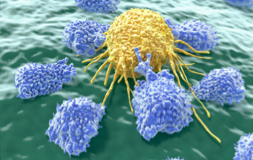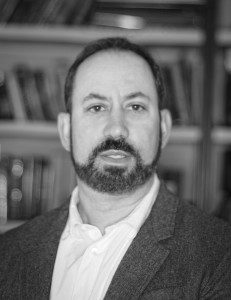SalvaRx: Fighting Cancer from Within

An Interview with Ian Walters, MD, CEO of SalvaRx plc
James Faulkner: Hi Ian. SalvaRx describes itself as a drug discovery and development company focused on immune-oncology. To the layman such as myself, that’s stimulating the immune system to fight cancer, right?
Ian Walters: Yes, some describe immunotherapy as fighting cancer from within. If your body’s immune system can find the cancer and identify it, it can clear the tumour. Cancer has many ways of evading the immune system, and our approaches to treating it focus on stimulating the immune system to recognise cancer and prevent cancer from evading the immune system.
JF: Can you begin by giving our readers a little background information on the company?
IW: Dr. Kramer and I both focused on immunology during our academic careers, and we both worked at BMS, championing and developing the two key drugs that started the modern cancer immunotherapy field (Yervoy and Opdivo). These drugs are called checkpoint inhibitors, and they prevent cancer from counterfeiting a signal that healthy cells use to keep immune cells from attacking them.
I have personally met patients who were given fewer than four months to live before treatment with these drugs and who have survived over ten years since their diagnosis with no evidence of cancer recurrence. I left BMS with a vision of how this field would unfold, and I wanted to be on the cutting edge of the field. Rob and I started SalvaRx to help other scientists and drug developers bring their immunotherapies to market, in a nimble and fast-paced environment. Jim Mellon and Gregory Bailey incubated the company and financed our first investment in iOx. We have looked through hundreds of immune-oncology companies and have identified some gems that could bring great value to patients.
JF: Both yourself and fellow co-founder Rob Kramer are former Bristol-Myers Squibb drug developers with a history of championing immune-oncology and developing immune-oncology therapeutics. How did your time at BMS prepare you for your current roles at SalvaRx? With all due respect, don’t they say that good scientists tend to make poor businessmen?
IW: When I first transitioned from academia to the private sector, I worked on a programme to develop a treatment for a fatal disease. The other scientists and I were excited about the project and very upset when the marketing and business folks stopped the programme because they believed it would never recoup its costs (net present value calculations were negative). That was a wakeup call for me: it showed me both that something was wrong with the way we developed drugs and that I needed new and different skills to succeed at my career goals. This inspired me to go back to school; I received an MBA from the Wharton School of Business and specialised in evaluating and prioritising life science projects.
Since that time I have worked in commercial, corporate, and business development groups of a few small companies and later BMS. I have had P&L responsibility for large teams with budgets of more than $300 million. I have chosen advisers and board members who can provide good business and financial advice, and my board is confident that I have the required business skills to make the company successful.
In my view, our experience as drug developers at BMS is more essential to the future success of the company. While at BMS, Rob and I learned how these drugs work, why they work, in which patients they might work, how to test them, how to develop them with an eye to the market, how to market and sell them, how to finance health authorities to approve them, and how to get insurers and health authorities to pay for them. On top of that, I worked in the business development group evaluating small companies that were developing similar technologies, setting up acquisitions and licensing deals, and negotiating collaborations with other academic and corporate partners. Our team has a unique skillset and the right blend of academic and commercial know-how that is well suited to bring immunotherapies to the market.
JF: In 2015, SalvaRx made its first investment in iOx Therapeutics, a University of Oxford spin-out that is developing compounds that stimulate Natural Killer T Cells. What is the significance of this investment for SalvaRx?
 IW: iOx is a core investment for SalvaRx, and Rob and I continue to manage its day-to-day operations. iOx was born of a collaboration between the University of Oxford and the Ludwig Institute for Cancer Research (LICR). Oxford scientists had learned a great deal about a key cell type in the immune system called a natural killer T-cell (NKT cells), and they partnered with the LICR to transform this research into a therapeutic.
IW: iOx is a core investment for SalvaRx, and Rob and I continue to manage its day-to-day operations. iOx was born of a collaboration between the University of Oxford and the Ludwig Institute for Cancer Research (LICR). Oxford scientists had learned a great deal about a key cell type in the immune system called a natural killer T-cell (NKT cells), and they partnered with the LICR to transform this research into a therapeutic.
NKT Cells both kill tumour cells directly and collaborate with the rest of the immune system, educating it on the tumour and stimulating them to attack. iOx has licensed multiple compounds that stimulate these cells. Our collaboration with Oxford and LICR has been tremendously valuable, both for our collaborators’ deep knowledge of tumour biology and for the institutional support that the University has provided. Oxford will conduct a sixty-patient study that not only tests the safety of the drug but also examines its efficacy, comparing iOx’s compounds with Opdivo and testing the combination of the two to see if our technology can make the other drugs work better. It is unusual for a first clinical trial to provide such a detailed understanding of a drug’s pharmacology, and the results of this trial may be the basis of later partnering discussions.
On Thursday, iOx announced a second collaboration, this time with a public/private consortium named PRECIOUS. The European Commission is funding the consortium to develop new immunotherapies. This grant, provided through the Horizon 2020 programme, will fund a new product that combines one of iOx’s compounds with an anti-tumour vaccine from the Ludwig Cancer Center using novel formulation technology from one of our partners. The grant will fund the development of this combination product, its manufacture, and its testing in two different clinical trials. We value our connections and collaborations with academic and governmental organisations and leverage them to offset the high costs of developing new drugs.
JF: You arrived on AIM in March via a reverse takeover of 3Legs Resources. You also raised £1.95 million (before expenses) in conjunction with that. How will those funds be deployed?
IW: These funds will cover operating expenses for iOx over the next 18 months and allow us to pursue the next transaction.
JF: The conventional treatments for cancer of all types are disparagingly labelled slash (surgery), poison (chemotherapy) and burn (radiotherapy). Given that cancers are essentially mutated cells that have evaded detection and destruction by the body’s own immune system, immune-oncology would appear to be the Holy Grail of cancer treatment. What kinds of advances can we expect from this exciting area of research in future?
IW: These drugs have been truly remarkable: the beauty of immunotherapy is that if we can teach your immune system to fight your cancer, it will keep fighting cancer not just on the day that you step out of the hospital but for the rest of your life. Immunotherapies also tend to be less toxic to normal tissues; letting cancer patients have a better quality of life not only during treatment but afterwards.
The two drugs that we helped develop at BMS are curing up to 35% of patients with certain tumour types, which is a great success; but 65% of patients haven’t benefited from immunotherapy yet, including a friend of mine who recently died. We think of the checkpoint inhibitors as a foundation for combination therapy, and our strategy is to find compounds to complement the checkpoint inhibitors so that they can help more patients.
JF: The dramatic efficacy benefits of immunotherapies have reduced the traditional drug development timeline by two years, allowing for smaller, shorter and less expensive clinical trials. Does this mean we can expect new drugs to reach the market quicker, and at a lower initial price, in future?
 IW: After years of reviewing products that added months to patients’ lifespans without long-term cures, the FDA and other health authorities have worked very closely with pharmaceutical companies to get immunotherapies to patients who need them very quickly. For example, Merck’s checkpoint inhibitor was approved and marketed only three years after starting human testing – other drugs might take up to ten! The results were so profound that FDA approved the drug based on one study of approximately 250 patients.
IW: After years of reviewing products that added months to patients’ lifespans without long-term cures, the FDA and other health authorities have worked very closely with pharmaceutical companies to get immunotherapies to patients who need them very quickly. For example, Merck’s checkpoint inhibitor was approved and marketed only three years after starting human testing – other drugs might take up to ten! The results were so profound that FDA approved the drug based on one study of approximately 250 patients.
Drug pricing is a fraught issue because of the tension between a health authority or insurer’s motivation to lower costs and the drug developer’s need to satisfy investors’ expectations. Drug companies usually employ a value-driven drug pricing strategy that examines what the alternative to care is – in this case usually end of life care and repeated hospitalisation that can be very costly. Even though prices for immunotherapies are high – >£100,000 per patient in the United Kingdom – NICE still found Yervoy cost effective, as around 15% of patients are expected to live out the rest of their natural lives.
While we do expect the prices of immunotherapies to be high while they are on patent, we expect the eventual entry of biosimilars and generics to reduce prices of older drugs and relieve the burden on the healthcare system. High prices for new drugs and low prices for old drugs gives investors an incentive to deploy vast amounts of capital on a very risky endeavour rather than invest in lower-yielding but safer assets. This system of incentives is the engine behind innovation in medicine, and we can thank it for major improvements in our standard of health over the past decades, including cancer immunotherapy.
JF: With the pharmaceutical majors cutting back on their R&D activities, is now the time to be investing in early-stage drug developers like SalvaRx? Presumably, the majors can simply let the smaller companies do all the hard work and then simply scoop up the winners to bolster their pipelines. Why would investors want to bear the additional risk when they can simply invest in their favourite pharma majors, which are now leaner and meaner?
IW: You are right that major pharma companies have cut back on internal R&D: there have been layoffs of thousands of scientists in the past decade because of a perception that internal R&D is too risky or unproductive. At the same time, major pharma still have large sales forces and internal infrastructure that are useless without new drugs to sell. Pharma has transferred the risk of R&D to small biotechs, but they have transferred much of the reward as well. At BMS, our budget for in-licensing new compounds was $8 billion while I was working at their business development unit. Deals struck by small companies are at record highs, especially in cancer immunotherapy. If you look at the past few deals in this space, once the products had exciting human data, pricetags have climbed above $1 billion.
Drug discovery is an inherently risky endeavour: a recent study has calculated that drugs that enter the clinic have roughly a 10% chance of approval. While the risks of drug development are great, the rewards of a successful programme are greater. For example, a billion dollar licensing deal would be about a 50x multiple of our current market cap—that sort of return is usually only seen in venture-backed private companies. One of our theses in listing SalvaRx on AIM was that there are relatively few small similar public British biotechs and that there was demand from British investors for that return profile.
While we can’t change the fundamental risks of drug development, we are building SalvaRx to mitigate as many risks to our investors as possible. We plan to add additional products to our pipeline with the goal of having one or two pivotal read-outs per year, diversifying compound specific risk. We have also chosen a field where there is a great deal of exciting science and proven therapeutic potential. In the event that one of our compounds is successful, our corporate structure will allow us to return significant capital to our shareholders without selling our entire pipeline.
JF: The biotech sector in general has suffered a setback on the markets of late. What’s your take on the recent sell-off and how do you view the healthcare market in general? Are we currently in the middle of a healthcare super-cycle?
IW: Our impression is that generalist funds have largely moved out of pharma stocks as a result of other macro events like the slowdown in the Chinese economy and crash in the energy sector; discussions of drug pricing as part of the American election have also been a catalyst for the downward move. Most political analysts predict that political drug pricing discussions will remain as discussions and that there won’t be changes to the drug pricing model that underlies Pharma and biotech. I have not seen any fundamental changes to the biotech and pharma companies, and I think that a large acquisition this year or next could bring generalists back into the sector. Pharma and Biotech are creating innovative drugs that are making real improvements in patients’ lives, and I think that these breakthroughs will always be rewarded.
JF: SalvaRx is said to be “actively screening acquisitions and investments in cancer immunotherapy and complementary areas of oncology.” Other than the immunotherapy market, what areas of cancer research are you most excited about right now?
IW: I am confident that immunotherapy will be around for a long time. Cell therapies have been interesting. Your body and cells have remarkable abilities to grow, heal, adapt, and in the case of T-cells to ward off abnormal cells. Cell therapy has great potential because cells can do much more than a small molecule or biologic that hits one or two targets; but this complexity has made the field unattainable until very recently. Scientists have learned how to harvest useful cells, manipulate them, and re-infuse them back into the patient. Groups like Juno, Kite, and Novartis have been developing increasingly sophisticated ways to manipulate cells, including genetic manipulations that help the cells directly target tumours. Cell therapy has had some very promising results in some small subsets of liquid tumours; in some cancers, nearly every patient responds to therapy. Although cell therapy isn’t our focus, I do find these results very exciting. There have been fundamental scientific and medical advances that are greatly improving our ability to treat cancer. That should be very exciting not only to investors but also to everyone who is affected by cancer or who has a loved one who is affected by cancer – in my mind that’s close to everyone. Regardless of what the healthcare market does in the short term, I think that the future is bright.
JF: You’re attending the Master Investor Show in Islington on Saturday 23rd April. Where can readers find you on the day?
IW: Stop by our booth, I look forward to discussing SalvaRx and our business model. Please also see our website and feel free to send us a note for more information: www.SalvaRx.io.
Comments (0)